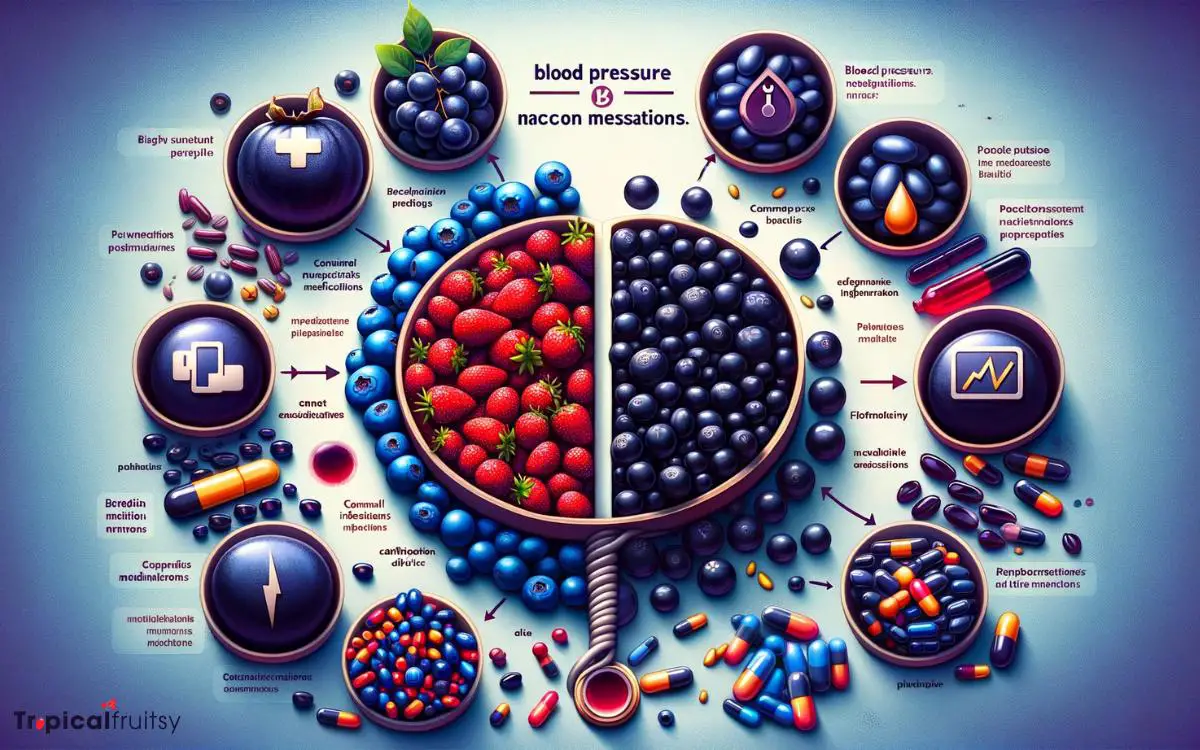Does Acai Berry Raise Blood Pressure: A Guide!
Acai berries are not known to raise blood pressure; in fact, they may have a beneficial impact due to their high antioxidant content.
However, individuals should consult with healthcare providers before integrating them into their diet, especially if they have hypertension or are on blood pressure medication.
The acai berry is often celebrated for its health benefits, especially its high levels of antioxidants, which can protect the body against oxidative stress, potentially lowering the risk of chronic diseases, including heart disease.
Antioxidants in acai berries, such as anthocyanins, may help improve endothelial function and consequently, could have a positive effect on blood pressure.
That being said, the direct effects of acai berries on blood pressure are not entirely clear and warrant further research.
Incorporating acai berries into your diet might contribute to cardiovascular health, but always align such choices with medical advice.

Key Takeaway
Impact of Acai Berries on Blood Pressure: Nutrient Benefits
| Nutrient | Beneficial Effects | Relevance to Blood Pressure |
|---|---|---|
| Anthocyanins | Improve endothelial function | May help lower blood pressure |
| Fiber | Promotes heart health | Beneficial for overall cardiovascular system |
| Omega Fatty Acids | Reduce inflammation | Supports cardiovascular health and may impact blood pressure |
| Vitamin A & C | Antioxidant properties | Can mitigate oxidative stress related to hypertension |
Understanding Blood Pressure
Blood pressure is the force exerted by circulating blood against the walls of the body’s arteries, the major blood vessels in the body. It is a critical physiological parameter, routinely measured to assess cardiovascular health.
A normal blood pressure reading is vital for the proper functioning of the circulatory system, ensuring oxygen and nutrient delivery to tissues and organs.

Elevated blood pressure, known as hypertension, is a significant risk factor for heart disease, stroke, and kidney failure.
Conversely, hypotension, or low blood pressure, can lead to inadequate blood flow and potential organ damage.
Therefore, maintaining blood pressure within a normal range is essential for overall health. Precise measurement and interpretation by healthcare professionals are key for the management of blood pressure-related health issues.
Acai Berry Nutritional Profile
Transitioning from the impact of blood pressure on health, it is pertinent to examine the acai berry’s nutritional composition, as it plays a crucial role in understanding its effects on cardiovascular health.
The acai berry is a nutrient-dense fruit, rich in various antioxidants, including anthocyanins and flavonoids, which are known for their potential vasodilatory effects.

Moreover, this fruit contains essential fatty acids such as omega-3, omega-6, and omega-9, which may contribute to a healthy lipid profile.
It is also a source of dietary fiber, aiding in digestive health, which can be indirectly associated with cardiovascular function.
Notably, acai berries offer a profile of plant sterols, which have been observed to help maintain normal cholesterol levels, further implicating a positive influence on blood pressure regulation.
Antioxidants and Cardiovascular Health
The presence of antioxidants in acai berries is pivotal in the context of cardiovascular health. These compounds can mitigate oxidative stress, a known risk factor for hypertension and other heart-related diseases.
Oxidative stress occurs when there is an imbalance between free radicals and antioxidants in the body, leading to damage to cells, proteins, and DNA.

Antioxidants from acai berries contribute to cardiovascular health by scavenging harmful free radicals.
This reduces oxidative damage to blood vessels, lowering the risk of plaque formation that can lead to hypertension.
Additionally, these antioxidants help improve endothelial function, which is critical for blood pressure regulation.
By maintaining the elasticity of blood vessels, antioxidants from acai berries can support optimal cardiovascular health.
Furthermore, antioxidants in acai berries have the potential to reduce inflammation. Chronic inflammation is associated with heart disease, and antioxidants can help modulate the body’s inflammatory response.
By reducing inflammation, acai berries can further contribute to maintaining cardiovascular health.
Acai Berries and Hypertension Research
Several studies have investigated the potential effects of acai berries on hypertension, offering insights into their role in blood pressure regulation.

The rich anthocyanin content in acai berries is hypothesized to enhance endothelial function, which may contribute to improved vascular responsiveness and a potential reduction in blood pressure.
| Study | Sample Size | Outcome |
|---|---|---|
| A | Small (n=30) | No significant effect on blood pressure |
| B | Moderate (n=100) | Slight reduction in systolic blood pressure |
| C | Large (n=200) | Noticeable decrease in both systolic and diastolic pressure |
| D | Meta-analysis | Inconclusive evidence due to variation in study designs |
Clinical analysis remains cautious as the heterogeneity of methodologies and sample populations in these studies precludes a definitive conclusion. Further research is warranted to clarify the extent of acai berries’ impact on hypertension.
Potential Side Effects of Acai
Despite the potential benefits, consumption of acai berries may also present side effects, including interactions with blood pressure medication.

Individuals on such medications must consult with a healthcare provider before incorporating acai berries into their diet.
The clinical evidence suggests that while acai berries offer antioxidant properties, they may also cause:
- Allergic reactions in susceptible individuals, particularly those with a pre-existing sensitivity to acai or similar berries.
- Digestive disturbances, as acai berries contain natural compounds that may affect gut motility and digestive enzymes.
- A potential impact on blood glucose levels, which is of particular concern for diabetic patients.
The consumption of acai should always be considered within the broader context of one’s overall dietary pattern and health status.
Acai Berry Consumption Guidelines
Considering the potential interactions with blood pressure medications, individuals should adhere to recommended consumption guidelines when incorporating acai berries into their diets.

It is imperative to consult healthcare providers, particularly for those on antihypertensive regimes, to ensure safe inclusion of acai berries.
The guidelines below serve as an initial framework for acai berry consumption, which can be adjusted based on individual health status and dietary needs.
| Quantity | Frequency |
|---|---|
| 100 grams (3.5 ounces) | Daily |
| 200 ml (6.8 ounces) | Acai juice per day |
| 2 tablespoons | Acai powder per day |
| 1-2 capsules | Acai supplement |
| As directed | Commercial products |
These figures are not prescriptive but suggest a moderate approach to acai intake. For tailored advice, a consultation with a dietitian or healthcare professional is recommended.
Interactions With Blood Pressure Medications
Acai berry supplementation may potentiate the effects of antihypertensive medications, necessitating careful monitoring of blood pressure levels by healthcare professionals.

When combined with blood pressure-lowering drugs, acai may enhance their hypotensive impact, which could result in blood pressure dropping too low.
This interaction underscores the importance of coordinated care, especially for individuals managing hypertension.
Key considerations include:
- Medication Adjustment: Dosages of antihypertensive drugs may require modification to avoid potential hypotension.
- Patient Education: Patients should be informed about the signs of hypotension to ensure timely intervention.
- Monitoring Frequency: Increased monitoring may be necessary to assess the patient’s response to the combined effect of acai supplements and blood pressure medication.
Clinicians must remain vigilant and may need to adjust treatment protocols to maintain optimal blood pressure control.
Can Acai Berry Tea Affect Blood Pressure?
Acai berry tea contains caffeine, which has been known to potentially affect blood pressure levels. Whether acai berry tea affects blood pressure may vary from person to person. It’s essential to consult a healthcare professional to determine if incorporating acai berry tea into your diet is suitable for you.
Will Drinking Acai Berry Tea Affect My Blood Pressure?
Yes, drinking acai berry tea with a high caffeine content can potentially affect your blood pressure. Caffeine can cause a temporary increase in blood pressure, so it is important to be mindful of your intake, particularly if you have hypertension or are sensitive to caffeine.
Making Heart-Healthy Dietary Choices
In the context of cardiovascular health, dietary choices play a critical role in managing blood pressure levels.
A diet rich in heart-healthy foods, particularly those high in fiber and antioxidants, can support arterial health. Limiting sodium intake is paramount to prevent hypertension.

Moreover, a balanced intake of omega-3 and omega-6 fatty acids is essential for maintaining cellular integrity and reducing inflammation within the cardiovascular system.
Foods for Heart Health
Dietary choices play a pivotal role in maintaining heart health, with certain foods like fruits, vegetables, whole grains, and lean proteins known to support cardiovascular function.
An evidence-based approach to nutrition emphasizes the inclusion of:
- Fruits and Vegetables: Rich in essential vitamins, minerals, and fiber, they contribute to reduced blood pressure and lower risk of heart disease.
- Whole Grains: Integral for maintaining healthy cholesterol levels, whole grains provide necessary fiber that aids in cardiovascular health.
- Lean Proteins: Sources such as fish, poultry, and legumes are associated with a lower risk of coronary heart disease due to their reduced saturated fat content.
For individuals seeking to improve or maintain heart health, incorporating these food groups into a balanced diet is recommended.
Limiting Sodium Intake
When considering heart-healthy dietary choices, it’s crucial to limit sodium intake as excessive consumption can lead to increased blood pressure.
The American Heart Association recommends no more than 2,300 milligrams a day and moving toward an ideal limit of no more than 1,500 mg per day for most adults.
Sodium, primarily found in salt, heightens the risk of hypertension by causing the body to retain fluid, which puts an extra burden on the heart.
To manage sodium intake effectively, it is advisable to choose fresh, whole foods over processed items, read nutrition labels carefully, and prepare meals at home where salt can be controlled.
As we focus on sodium’s impact on heart health, it is also essential to consider the balance of dietary fats—specifically omega fatty acids—which play a pivotal role in cardiovascular wellness.
Balancing Omega Fats Ratio
Transitioning from sodium reduction, strategically increasing the intake of omega-3 fatty acids while decreasing omega-6 fats can further improve heart health and potentially influence blood pressure regulation.
The balance between these essential fats is crucial, as they play different roles in the inflammatory process and cardiovascular function.
- Increase Omega-3s: Found in fatty fish, flaxseeds, and walnuts, omega-3s are anti-inflammatory and can reduce blood vessel constriction.
- Limit Omega-6s: Predominantly in processed foods and certain vegetable oils, high omega-6 levels can promote inflammation when out of balance with omega-3s.
- Monitor Fat Intake: Balance is key, as both fats are essential but in the correct ratios to support cardiovascular health.
Clinical evidence suggests that a diet with a favorable omega-3 to omega-6 ratio can support endothelial function and lower the risk of hypertension.
Conclusion
In the tapestry of dietary choices for cardiovascular health, the acai berry emerges as a vibrant thread, offering a rich blend of antioxidants that may benefit heart health.
While research is still burgeoning, evidence suggests that acai berries do not raise blood pressure and may, in fact, contribute to its regulation.
It remains imperative to consume these berries judiciously, considering potential interactions with medications and underlying health conditions, and to weave them into a balanced diet for optimal heart health.






